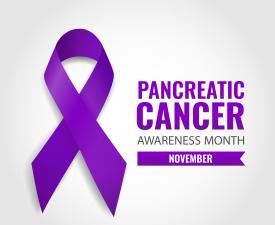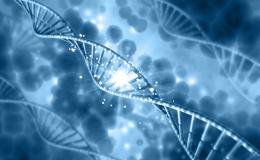What Are the Signs and Symptoms of Pancreatic Cancer?
November 23, 2020
Pancreatic cancer is cancer that starts in the pancreas, an organ that produces digestive enzymes and regulates blood sugar levels in the body. Pancreatic cancers are the ninth and 10th most common cancer diagnoses in women and men in the United States, respectively,1 and have the worst 5-year survival rate of any cancer type, at roughly 10%.2

In recognition of Pancreatic Cancer Awareness month this November, we highlight the disease, its signs and symptoms, and what steps you should take if you or someone you care about is experiencing symptoms consistent with the disease.
The two most common types of pancreatic cancer are ductal adenocarcinomas and neuroendocrine tumors (NETs). The two cancers differ in the type of cell the cancer originates from in the pancreas: ductal adenocarcinomas start in the ducts of the pancreas that are responsible for transporting enzymes for digestion and NETs start in islet cells that regulate blood sugar levels in the body. Ductal adenocarcinomas account for over 90% of all pancreatic cancer diagnoses while NETs account for less than 5% of cases.3 Because pancreatic cancers can differ in the cell type they originate from, the signs and symptoms of the disease can also differ depending on what type of pancreatic cancer is present. Signs and symptoms of the disease can include:
● Abdominal pain that radiates to the back
● Loss of appetite
● Unintentional weight loss
● Jaundice (yellowing of whites of eyes and skin)
● Changes in stool
● Dark-colored urine
● Itchy skin
● Recent diabetes diagnosis or diabetes that is more difficult to treat
● Blood clots
● Fatigue
● Nausea
● Pancreatitis
Importantly, there are few, if any, symptoms in the early stages of pancreatic cancer, and most symptoms occur in more advanced stages of the cancer. &Because of this, most pancreatic cancer diagnoses are made at advanced stages of the disease when the disease is more difficult to treat. Late-stage diagnoses are a major factor contributing to the disease’s lowest 5-year survival rate of any cancer in the United States.2
Risk factors for pancreatic cancer include smoking, obesity, diabetes, pancreatitis and a family history of the disease, particularly on one side of the family. Interestingly, about 10% of all pancreatic cancer diagnoses are thought to be hereditary cancers, or cancers caused by an adverse gene mutation (change) that can be passed from an affected parent to their child. Some hereditary cancer syndromes, such as hereditary breast and ovarian cancer (HBOC) and Lynch syndromes, are associated with an increased risk of pancreatic and other cancers. Research is ongoing for other familial pancreatic cancers where a causative gene mutation has not been established.
If you or someone you care about is experiencing symptoms consistent with pancreatic cancer, it is important you see a doctor for evaluation. Additionally, if you have a family history of pancreatic and other cancers, it is important to discuss your family history with a doctor to better assess your hereditary cancer risk. Regardless of whether a cancer is hereditary or not, early detection is critical for effective disease treatment. Comprehensive hereditary cancer tests screen a panel of hereditary cancer-associated genes for mutations that increase the likelihood of developing a variety of cancers, allowing clinicians to tailor disease screenings based on your specific risk and detect cancer at the earliest possible stage. The Kailos Genetics ExpedioTM Hereditary Cancer Screening test screens a number of hereditary cancer genes, including all of the genes associated with HBOC and Lynch syndromes. Click here to learn more about ExpedioTM or contact us with any questions you may have regarding our hereditary screenings.




